直接英语和间接英语句型转换
英语直接引语与间接引语的转换
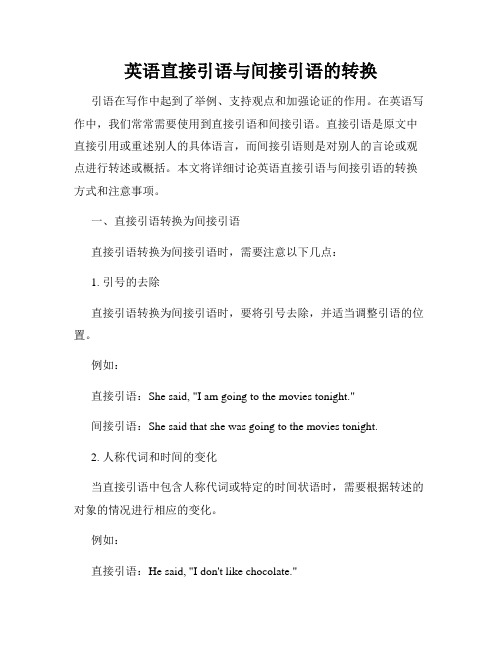
英语直接引语与间接引语的转换引语在写作中起到了举例、支持观点和加强论证的作用。
在英语写作中,我们常常需要使用到直接引语和间接引语。
直接引语是原文中直接引用或重述别人的具体语言,而间接引语则是对别人的言论或观点进行转述或概括。
本文将详细讨论英语直接引语与间接引语的转换方式和注意事项。
一、直接引语转换为间接引语直接引语转换为间接引语时,需要注意以下几点:1. 引号的去除直接引语转换为间接引语时,要将引号去除,并适当调整引语的位置。
例如:直接引语:She said, "I am going to the movies tonight."间接引语:She said that she was going to the movies tonight.2. 人称代词和时间的变化当直接引语中包含人称代词或特定的时间状语时,需要根据转述的对象的情况进行相应的变化。
例如:直接引语:He said, "I don't like chocolate."间接引语:He said that he didn't like chocolate.直接引语:She said, "I will visit my grandparents next week."间接引语:She said that she would visit her grandparents the following week.3. 动词语态的变化根据转述的对象的情况,有时需要对直接引语中的动词语态进行相应的变化。
例如:直接引语:He said, "I have finished my homework."间接引语:He said that he had finished his homework.4. 时态的变化转述的时态通常要比直接引语中的时态向过去倾斜。
例如:直接引语:She said, "I am reading a book."间接引语:She said that she was reading a book.直接引语:He said, "I will go shopping tomorrow."间接引语:He said that he would go shopping the next day.二、间接引语转换为直接引语间接引语转换为直接引语时,需要注意以下几点:1. 引号的添加将间接引语转换为直接引语时,需要在转述的部分前后添加引号。
人教版高一英语--直接引语与间接引语的转换
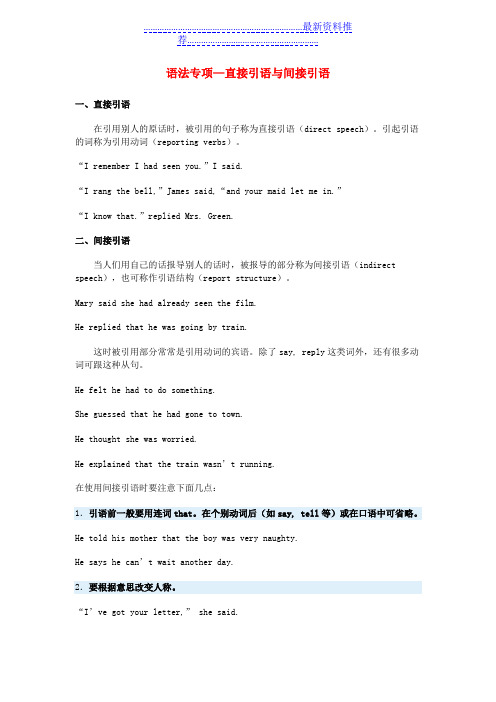
语法专项—直接引语与间接引语一、直接引语在引用别人的原话时,被引用的句子称为直接引语(direct speech)。
引起引语的词称为引用动词(reporting verbs)。
“I remember I had seen you.”I said.“I rang the bell,”James said,“and your maid let me in.”“I know that.”replied Mrs. Green.二、间接引语当人们用自己的话报导别人的话时,被报导的部分称为间接引语(indirect speech),也可称作引语结构(report structure)。
Mary said she had already seen the film.He replied that he was going by train.这时被引用部分常常是引用动词的宾语。
除了say, reply这类词外,还有很多动词可跟这种从句。
He felt he had to do something.She guessed that he had gone to town.He thought she was worried.He explained that the train wasn’t running.在使用间接引语时要注意下面几点:1.引语前一般要用连词that。
在个别动词后(如say, tell等)或在口语中可省略。
He told his mother that the boy was very naughty.He says he can’t wait another day.2.要根据意思改变人称。
“I’ve got your letter,” she said.→She said to him, “Your pronunciation is better than mine.”→3.引语中的谓语要和句子主要谓语在时态上一致。
直接引语变间接引语常用的三种情况

直接引语变间接引语常用的三种情况1、陈述句变成间接引语(1)“I am a teacher” she said。
She said that she was a teacher.“You don’t tell her my telephone number” he said。
He said (that)I didn't tell her his telephone number。
要注意时态的变化一般现在时变成一般过去时。
一般过去时变成过去完成时,现在完成时变成过去完成时,一般将来时变成过去将来时,this 变成that these变成those,here 变成there ,today 变成that day, yesterday 变成the day before,tomorrow 变成next day, the day after tomorrow变成in two days’ time,now 变成then等等.2、将一般疑问句变成间接引语在这样的句子中要加“if” “是否"的意思.(1)”Are you a student?"She asked me if I was a student。
她问我是否是一位学生。
将原来的疑问句放在if 后面,但语顺变成肯定式的语顺. 另外还可以用whether 来表示。
She asked me whether I was a student.(2) "Did you finish your work yesterday?”He asked me if I have finished my work the day before.3.将特殊疑问句变成间接引语”What time is it?”He asked me what time it was。
"When will you go to town?”He asked me when would I go to town。
提分必备冀教版小学英语句型转换方法详解
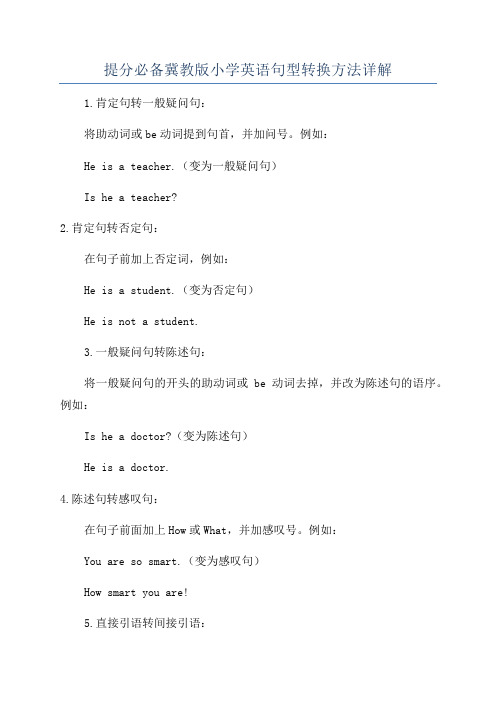
提分必备冀教版小学英语句型转换方法详解
1.肯定句转一般疑问句:
将助动词或be动词提到句首,并加问号。
例如:
He is a teacher.(变为一般疑问句)
Is he a teacher?
2.肯定句转否定句:
在句子前加上否定词,例如:
He is a student.(变为否定句)
He is not a student.
3.一般疑问句转陈述句:
将一般疑问句的开头的助动词或be动词去掉,并改为陈述句的语序。
例如:
Is he a doctor?(变为陈述句)
He is a doctor.
4.陈述句转感叹句:
在句子前面加上How或What,并加感叹号。
例如:
You are so smart.(变为感叹句)
How smart you are!
5.直接引语转间接引语:
将直接引语变为间接引语时,需要改变时态、人称、时间和地点等内容。
She said, "I am happy."(变为间接引语)
She said that she was happy.
6.句型转换:
将一个句型转换成另一个句型时,需要根据具体情况进行变换。
例如:
I have a book.(变为同义句)
I possess a book.。
英语改间接引语句的方法

英语改间接引语句的方法宝子们,今天咱们来唠唠英语里把直接引语改成间接引语这个事儿哈。
咱先说说啥是直接引语呢?就是直接把别人说的话原封不动地写出来,像“He said, ‘I like apples.’”这就是直接引语。
那间接引语呢,就是把别人的话用自己的话转述一下,就变成“He said that he liked apples.”啦。
那咋改呢?如果直接引语是陈述句,这就比较简单啦。
你就把引语中的人称根据情况改一下,像第一人称“I”,如果是别人说的话,转述的时候可能就变成“he”或者“she”啦。
然后呢,时态也要变一变哦。
一般现在时通常要变成一般过去时呢,就像刚刚例子里的“like”变成“liked”。
还有那个引号和逗号就不要啦,中间加上个“that”,不过有时候“that”也可以省略的哟。
要是直接引语是个疑问句呢?这就有点小特别咯。
如果是一般疑问句,你得把语序调整一下。
比如说,“He asked, ‘Are you a student?’”改成间接引语就是“He asked me if/whether I was a student.”你看,这个语序就从疑问语序变成陈述语序啦,而且“are”变成了“was”,还加上了“if”或者“whether”来表示“是否”的意思呢。
要是特殊疑问句呢,也是把语序调整成陈述语序。
像“She asked, ‘What do you do?’”就变成“She asked me what I did.”特殊疑问词就照抄下来,后面的句子变成陈述语序,时态也跟着变。
宝子们,再说说祈使句变间接引语哈。
祈使句就是那种表示命令、请求的句子。
如果是肯定的祈使句,比如说“Close the door.”改成间接引语就是“He told me to close the door.”要是否定的祈使句“Don't be late.”就变成“He told me not to be late.”就是这么神奇呢。
学会初高中英语中的直接与间接宾语的转换

学会初高中英语中的直接与间接宾语的转换在学习英语的过程中,掌握直接与间接宾语的转换是非常重要的一部分。
直接宾语是动作的承受者,而间接宾语则是动作的接受者。
通过转换直接与间接宾语的位置,我们可以更好地理解句子的结构,提高语言表达的准确性和流利度。
一、直接宾语的转换直接宾语通常是动词的直接承受者,它回答了“谁”或“什么”这样的问题。
当我们需要转换直接宾语时,我们需要注意以下几点:1. 将直接宾语变为间接宾语例如,原句“Tom bought a book.”可以转换为“Tom bought me a book.”这里,“a book”是原句中的直接宾语,而“me”是转换后的间接宾语。
2. 在直接宾语前加上介词有些动词需要在直接宾语前加上介词,这样转换后的句子更加准确。
例如,“I ate an apple.”可以转换为“I ate an apple with a knife.”这里,“an apple”是原句中的直接宾语,而“with a knife”是转换后的介词短语。
3. 将直接宾语变为名词性从句有些情况下,直接宾语可以被转换为名词性从句。
例如,“She believes him.”可以转换为“She believes that he is telling the truth.”这里,“him”是原句中的直接宾语,而“that he is telling the truth”是转换后的名词性从句。
二、间接宾语的转换间接宾语通常是动作的接受者,它回答了“给谁”或“对谁”这样的问题。
当我们需要转换间接宾语时,我们需要注意以下几点:1. 将间接宾语变为直接宾语例如,原句“Tom gave a book to Mary.”可以转换为“Tom gave Mary a book.”这里,“Mary”是原句中的间接宾语,而“a book”是转换后的直接宾语。
2. 在间接宾语前加上介词有些动词需要在间接宾语前加上介词,这样转换后的句子更加准确。
直接引语和间接引语讲解及练习

直接引语变间接引语这两种引语都是宾语从句,但是直接引语放在引号内,不用连词联接;间接引语不用引号,通常用连接词与主句联接一、直接引语变间接引语时句式的变化例:Hesaid,“I'mveryglad.”→Hesaidhewasveryglad.例:Hesaid,“Canyoucomethisafternoon,John”→HeaskedJohncouldcomethatafternoon.例:Hesaid,“WhereisMr.Wang”→Heasked whereMr.Wangwas.Tomsaystome,“whatfood doyoulikebest”.→TomasksmefoodIlikebestOurparentstoldus“LearnEnglishwell”我们的父母告诉我们:“把英语学好啊”OurparentstoldusEnglishwell.我们的父母告诉我吗要把英语学好;Theteachersaidtome,“Don’treadthatnovel”Theteacherasked/toldmethatnovel.Ourparentstoldus,“Neverdowrong”父母告诉我们:“不要做错事”Ourparentstoldusnevertodowrong.我们的父母告诉我们不要做错事;二、人称的变化例如:“I wenttotheGreatWallyesterday,”LiHua said.→LiHuasaidthat he hadgonetotheGreatWallthedaybefore.“I’llcometohelp you wheneveryouneedmyhelp,”he answered her.→Heansweredherthat he wouldcometohelp her wheneversheneededhishelp.Shesaidto me,“Your pronunciationisbetterthanhis.”→Shetoldmethat my pronunciationwasbetterthanhis.三、时态变化主句的谓语动词是一般过去时,从句的谓语动词在时态方面要做相应的变化直接引语变为间接引语时时态不作改变的情况Hesays,“I’mtired.”→Hesaysthatheistired.Hewillsay,“Theboywaslazy.”→Hewilltellyouthattheboywaslazy.Ourgeographyteachersaidtous,“Theearthgoesroundthesun.”→Ourgeographyteachertoldusthattheearthgoesroundthesun.Shesaid,“Iwasbornin1995.”→Shesaidthatshewasbornin1995.典型例题1Canyoutellme_______A.whatthematterisB.whatmatteritisC.what’sthematterD.thematteriswhat2Thephysicsteachersaidtheearth____aroundthesun.A.ismovingB.movedC.hadmovedD.moves语法专练1.Motheraskedtheyoungestkid____withhiscar.A.whatthematterB.WhatwasthematterC.whatthematterisD.whatisthematter2.Thetouristaskedtheguidewhathe____visitthenextday.A.wasgoingtoB.willC.isgoinginD.isto3.Theteachertoldusthatlight____fasterthansound.A.traveledB.hadtraveledC.istravelingD.travels4.Tomhankstoldhisteacherthathe____bornin1968.A.wasB.hadbeenC.isD.hasbeen5.LindaaskedAmy_____shecouldtellherthegeneralideasofthepoem.A.thatB.whetherC.whatD.how6.Mybrothersaidtome,“I’mgoingtohaveaholidaynextweek.”Mybrother________________________________goingtohaveaholidaythenextweek.7.Mothersaidtome,“Whatareyoudoingintheroom”Motheraskedme___________________________________intheroom.8.Heasked,“CanIborrowyourbike”Heasked_______________________borrowmybike9.Tomsaidtome,“Doyoulikefootball”Tomaskedme_________________________football10.Shesaidtome,“Iwentovermylessonslastnight.”Shetoldme____________________________overherlessonsthenightbefore.附:UnitI短语归纳1.做个好朋友tobeagoodfriend2.做下列调查makethefollowingsurvey3.合计总分addupthescore4.得分getpoints5.心烦意乱地来到学校cometoschoolupset6.不理睬铃声ignorethebell7.使你那个德国朋友平静下来calmdownyourGermanfriend8.关心你朋友beconcernedaboutyourfriends9.松开了getloose10.不得不去户外遛狗havegottowalkthedogoutdoors11.帮他期末考试作弊helphimcheatintheend-of-termexam12.列出理由makealistofreasons/listthereasons13.记下一连串的请求setdownaseriesofrequests14.根据问卷调查accordingtothequestionnaire15.根据编辑的忠告accordingtotheeditor’sadvice16.为了分担你的困难inordertoshareyourdifficulties/troubles17.与老板相爱fallinlovewiththeboss18.与我的同桌相处融洽getalong/onwellwithmydeskmate19.关心青少年beconcernedaboutteenagers20.为了和老板面对面地交流inordertocommunicatewiththebossfacetoface21.信任政府trust/believeinthegovernment22.经历了太多的战争gothroughtoomanywars23.相邻的城镇neighboringtowns24.相邻的国家neighboringcountries直接引语变间接引语练习题一、将所给直接引语变为间接引语,每空一词:1.“Inevereatmeat.”hesaid.Hesaidthat______never______meat.2.“I’vefoundmywallet.”hesaidtome.He______methathe__________________wallet.3.“Itookithomewithme.”shesaid.Shesaidthat___________________ithomewithher.4.Theteachersaid,“Thesunrisesintheeastandgoesdowninthewest.”Theteachersaidthatthesun______intheeastand______downinthewest.5.“Imetheryesterday.”hesaidtome.He______methathe______mettheday______.6.“Youmustcomeherebeforefive.”hesaid.HesaidthatI______togo______beforefive.7.“Iboughtthehouse10yearsago.”hesaid.Hesaidthathe_______boughtthehouse10years_______.8.“Didyouseeherlastweek”hesaid.He____________Ihadseenhertheweek_______.9.Hesaid,“Youcansithere,Jim.”He______Jimthathe______sitthere.10.Heasked,“Howdidyoufindit,mother”Heaskedhermother__________________foundit.11.“Wherehaveyoubeenthesedays”heasked.Heaskedme_____________________been_______days.12.“Doyouknowwhereshelives”heasked.Heasked____________knewwhereshe______.13.“Stopmakingsomuchnoise,children.”hesaid.He______thechildren____________makingsomuchnoise.14.“Don’ttellhimthenews.”shesaid.Shetoldme___________________himthenews.15.“Iamhavingsupper,”hesaid.Hesaidthat______________havingsupper.16.“I’veseenthefilm,”Ginasaidtome.Gina_______methatshe______________thefilm.17.“Iwenthomewithmysister,”shesaid.Shesaidthat_____________________homewithhersister.18.“Keepquiet,children.”hesaid.He_______thechildren______________quiet.20.“Don’tlookoutofthewindow,”shesaid.Shetoldme_____________________outofthewindow.家庭作业1.“Iamhavingsupper,”hesaid.Hesaidthat______________havingsupper.2.“I’veseenthefilm,”Ginasaidtome.Gina_______methatshe______________thefilm.3.“Iwenthomewithmysister,”shesaid.Shesaidthat_____________________homewithhersister.4.Theteachersaid,“Thesunisbiggerthanthemoon.”Theteachersaidthatthesun_______biggerthanthemoon.5.“Imetheryesterday,”hesaidtome.Hetoldmethathe_______methertheday_______.6.“Youmustcomeherebeforefive,”hesaid.HesaidthatI_______togo_______beforefive.7.“Iboughtthecomputertwoweeksago,”shesaid.Shesaidthatshe_______boughtthecomputertwoweeks_______.8.“Didyoureadthebooklastweek”hesaid.He______________Ihadreadthebooktheweek_______.9.Hesaid,“Youcansithere,Jim.”He_______Jimthathe_______sitthere10.Heasked,“Howdidyoufindit,mother”Heaskedhermother_____________________foundit.11.“Wherehaveyoubeenthesedays”heasked.Heaskedme_____________________been_______days.12“Doyouknowwhereshelives”heasked me.Heaskedme______________knewwhereshe_______.13.“Keepquiet,children.”hesaid.He_______thechildren______________quiet.14.“Don’tlookoutofthewindow,”shesaid.Shetoldme_____________________outofthewindow.15.“Areyouinterestedinthis”hesaid tome.Heasked______________Iwasinterestedin_______.。
(完整版)英语语法如何把直接引语转换为间接引语
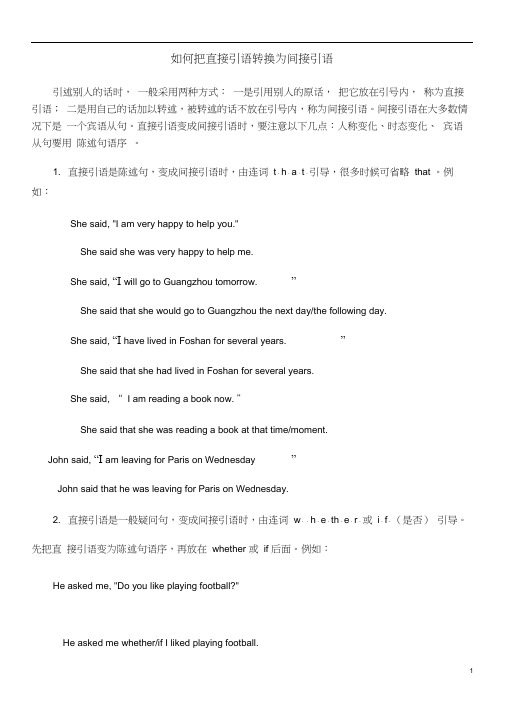
如何把直接引语转换为间接引语引述别人的话时,一般采用两种方式:一是引用别人的原话,把它放在引号内,称为直接引语;二是用自己的话加以转述,被转述的话不放在引号内,称为间接引语。
间接引语在大多数情况下是一个宾语从句。
直接引语变成间接引语时,要注意以下几点:人称变化、时态变化、宾语从句要用陈述句语序。
1. 直接引语是陈述句,变成间接引语时,由连词t.h.a.t.引导,很多时候可省略that 。
例如:She said, "I am very happy to help you."She said she was very happy to help me.She said, “I will go to Guangzhou tomorrow. ”She said that she would go to Guangzhou the next day/the following day.She said, “I have lived in Foshan for several years. ”She said that she had lived in Foshan for several years.She said, “ I am reading a book now. ”She said that she was reading a book at that time/moment.John said, “I am leaving for Paris on Wednesday ”John said that he was leaving for Paris on Wednesday.2. 直接引语是一般疑问句,变成间接引语时,由连词w..h.e.th.e.r.或i.f.(是否)引导。
先把直接引语变为陈述句语序,再放在whether 或if 后面。
例如:He asked me, "Do you like playing football?"He asked me whether/if I liked playing football.He asked Mary, “Will you come to my birthday party?You will come to my birthday party.He asked Mary whether/if she would come to his birthday party.注意:大多数情况下,if 和whether 可以互换,但后有or not, 或在动词不定式前,或放在介词后作连接词时,一般只用whether 。
英语句型转换的方法与例子

英语句型转换的方法与例子摘要英语句型转换是指按照一定的要求,把一个句子改写成另一个意思相同或相近的句子,不改变原句的主要意思。
英语句型转换的目的是为了使句子更加简洁、准确、自然和地道,也可以增加句子的变化和丰富性,避免重复和单调。
英语句型转换的方法有很多,本文将介绍以下几种常见的方法:同义词或近义词替换主动语态和被动语态互换陈述句和疑问句互换直接引语和间接引语互换并列句和复合句互换定语从句和非限制性定语从句互换分词短语和独立主格结构互换一、同义词或近义词替换定义同义词或近义词替换是指用意思相同或相近的词或短语来替换原句中的某些词或短语,使句子更加简洁、准确或地道。
规则替换的词或短语必须在意思、用法、搭配和语气上与原词或短语相符。
替换后的句子不能改变原句的主要意思。
替换后的句子不能造成歧义或误解。
例子原句替换后的句子He is very angry with me.He is very mad at me.She passed away last night.She died last night.He made a mistake in the test.He went wrong in the test.I can't stand him.I hate him.He gave me a hand with my homework.He helped me with my homework.二、主动语态和被动语态互换定义主动语态和被动语态互换是指把一个主动语态的句子改写成一个被动语态的句子,或者把一个被动语态的句子改写成一个主动语态的句子,使句子更加客观、强调或适应上下文。
规则主动语态变被动语态时,要把原主语变成by短语放在被动语态谓语之后,把原宾语变成新主语放在被动语态谓语之前,把原谓语动词变成被动形式(即be+过去分词),并保持时态、人称和数一致。
被动语态变主动语态时,要把原by短语去掉,把原主语变成新宾语放在主动谓语之后,把原谓语动词变成主动形式,并保持时态、人称和数一致。
直接引语变间接引语(带答案)

直接引语变间接引语时间状语、地点状语、指示代词及方向性动词的变化now—then today—that day yesterday—the day before last might—the night before two days ago—two days before next week—the next week tomorrow—the next day the day after tomorrow—in two days here—there this—that these—those come—go bring—take例如He said,"I did my homework yesterday."—He said he had done his homework the day before.巩固练习:1、He asked,"Is the door open or closed."He asked _____ _____ _____ _____ _____ _____ _____.2、She said,"I have left my coat in your room."She said _____ _____ _____ _____ _____ ______ ______ ______.3、She said,"I wrote to my friends yesterday."She said _____ _____ _____ _____ _____ _____ ______ ______ _______ ______..4、Mother asked me,"When will you be back next time."Mother asked me_____ _____ _____ _____ _____ _____ _____ _____.5、The teacher told the students,"The earth is round."The teacher told the students_____ _____ _____ _____ _____ .6、The guard said to Lenin,"Please show me your pass."The guard asked Lenin_____ _____ _____ _____ _____ .7、Danny said ,"Are you leaving today or tomorrow, Ling Ming?"Danny asked Li Ming_____ _____ _____ _____ _____ _____ _____ ______ ______ ______.8、He said ,"My sister was here two days ago, but she is not here now"He said _____ _____ _____ _____ _____ _____ _____ _____ ,but_____ was not there then.将所给直接引语变为间接引语,每空一词:1.“I never eat meat.” he said.He said that ______ never ______ meat.2.“I’ve found my wallet.” he said to me.He ______ me that he ______ ______ ______ wallet.3.“I took it home with me.” she said.She said that ______ ______ _______ it home with her.4. The teacher said, “The sun rises in the east and goes down in the west.”The teacher said that the sun ______ in the east and ______ down in the west.5.“I met her yesterday.” he said to me.He ______ me that he ______ met the day ______.6. “You must come here before five.” he said.He said that I ______ to go ______ before five.7. “I bought the house 10 years ago.” he said.He said that he _______ bought the house 10 years _______.8. “Did you see her last week?” he said.He ______ ______ I had seen her the week _______.9. He said, “You can sit here, Jim.”He ______ Jim that he ______ sit there10. He asked, “How did you find it, mother?”He asked her mother ______ ______ ______ found it.11. “Where have you been these days?” he asked.He asked me _______ _______ _______been _______ days.12. “Do you know where she lives?” he asked.He asked _____ ______ knew where she ______.13. “Stop making so much noise, children.” he said.He ______ the children ______ ______ making so much noise.14. “Don’t tell him the news.” she said.She told me _______ ______ ______ him the news.15. “Are you interested in this?” he said.He ______ ______ I was interested in ______.1.He said: “I’ve left my book in my room.”2.She said: “He will be busy.”3.She said to Tom, “Can you help me?”4.She asked, “Is this book yours or his?”5.The teacher asked, “how did you repair it?”6.The teacher said to the students, “Don’t waste your time.”7.The mother said, “Tom, get up early, please.”8.The teacher said, “The earth goes round the sun.”9.My father said, “Practice makes perfect.”10.The boy said to us, “I usually get up at six every day.”11.He said, “We are still students.’12.He said to me, “I was born in 1978.13.The engineer said, “I was at college in 1967.”14.He said, “I have studied English since I was a boy.”15.She said, “I read the book while I was waiting for a bus.附答案:答案:巩固练习:1. if the door was open or closed2. she had left her coat in my room3. that she had written to her friends the day before4 .when I would be back the next time5. that the earth is round6 .to show him his pass7 .whether he was leaving that day or the next day8. his sister had been there two days before ,she .将所给直接引语变为间接引语,每空一词:1. he, ate2. told, had, found, his3. she, had, taken4. rise, goes5. told, had, before6. had, there7. had, before 8. asked, if [whether], before9. told, could 10. how, she, had11. where, I, had, those 12. if [whether], I, lived13. told, to, stop 14. not, to, tell15. asked, if [whether], that1.He told me that he had left his book in his room.2.She said that he would be busy.3.She asked Tom if /whether he could help her.4.She asked me whether that book was mine or his.5.The teacher asked me how I had repaired it.6.The teacher told the students not to waste their time.7.The mother asked Tom to get up early.8.The teacher said that the earth goes round the sun.9.My father said practice makes perfect.10.The boy told us he usually gets up at six every day.11.He said they are still students.12.He told me that he was born in 1978.13.The engineer said he was at college in 1967.14.He said he had studied English since he was a boy.15.She said she had read the book while she was waiting for a bus.。
初中英语语法:直接引语变间接引语详解附练习及答案

直接引语和间接引语Direct speech and Indirect speech1.什么是直接引语?----直接引述别人的原话,一般加冒号,且没有时态呼应的问题;如:He said, “I’m afraid I can’t finish the work.”2.什么是间接引语?-----用自己的话转述别人的话,不用引号,通常情况构成宾语从句,从句中的语序,时态,人称,时间状语,地点状语,和指示代词等都有变化。
如:He said that he was afraid he couldn’t finish the work.3. 为什么要把直接引语变成间接引语?----当你需要转述别人的话的时候就需要用到;除了用say,还可以用tell, ask等。
4.所转述的内容可以是陈述句,疑问句,特殊疑问句,祈使句,感叹句,这几种情况下该怎么将直接引语变成间接引语呢?只要记住刚刚说的那6点:语序,时态,人称,时间状语,地点状语,和指示代词,记住相对应的变化规则,那么就不是一件难事。
下面我们来看例子:直接引语:He said, “My dad will be back tomorrow morning”间接引语:He said that his dad would be back the next/following morning..我们来分析一下这个例句,时态,人称,时间状语都发生了变化My dad---his dad, will be back---would be back, tomorrow morning---the next/following morning一、下面我们先看时态不变的5种情况:1)直接引语是客观真理,自然现象,名言,俗语,或者与一个具体的过去时间连用说明客观事实时,不管主句的谓语动词是什么时态,变为间接引语的时候时态均不变,如:Eg.1---“The earth moves around the sun,” the teacher told us.The teacher told us the earth moves around the sun.Eg.2---He said, “I was born in Guangdong in 1990”.He said he was born in Guangdong in 1990.Eg.3---Goethe said, “The important thing in life is to have a great aim, and the determination to attain it.”Goethe said the important thing in life is to have a great aim, and the determination to attain it.Eg.4:He said, “Practice makes perfect.”He said that practice makes perfect.2)主句的谓语动词是现在是或将来时,变成间接引语时时态不变Eg.1---He says, “I finished the work.”He says he finished the work.Eg.2---He will say, “I have watered the flower.”He will say he has watered the flower.Eg.3---He will say, “I will try my best to help you.”He will say he will try his best to help me.3)直接引语如果是一般现在时,表示反复出现或习惯性动作,变为间接引语时时态不变。
直接英语和间接英语句型转换

直接英语和间接英语句型转换•一、句型的变化•(一)如果直接引语是陈述句,间接引语一般是用that来引导。
口语中that常可以省略。
• “I like to listen to rock music,” said Peter.• Peter said that he liked to listen to rock music.•【温馨提示】如果直接引语中出现两个或两个以上的陈述句并列时,第一个that可以省略,后面一个不能省略,以免引起歧义。
如:•The teacher said, “The text is very important. You should learn it by heart.”• The teacher said (that) the text is important and that we should learn it by heart.(二) 如果直接引语是一般疑问句或选择疑问句时,间接引语常变为由whether/if引导,而且要用陈述句语序。
如:1) The boy asked his mother, “Can I go to play football with my friends on Saturday?”The boy asked his mother whether/if he could go to play football with his friends on Saturday.2) “Will you go to the museum this weekend or next weekend?” Li Hua asked me.Li Hua asked me whether/if I would go to the museum this weekend or the next weekend. (三) 如果直接引语是特殊问句,间接引语用特殊疑问词引导,而且用陈述句语序。
小学英语各种句型转换的方法

小学英语各种句型转换的方法1. 直接转换句型直接转换句型是指将一个句子从一种结构转换到另一种结构,而不改变句子的意思。
以下是一些常见的直接转换句型:1.1. 陈述句转疑问句将一个陈述句转换为疑问句的方法是在句首加上相应的疑问词(如who, what, where, when, why, how等),并调整动词的位置。
例如:- She is a teacher. → Is she a teacher?- They have a dog. → Do they have a dog?1.2. 肯定句转否定句将一个肯定句转换为否定句的方法是在动词前面加上not。
例如:- He likes ice cream. → He does not like ice cream.- We play soccer on Sundays. → We do not play ___.1.3. 一般现在时转一般过去时将一个一般现在时的句子转换为一般过去时的方法是将动词的时态从现在变为过去。
例如:- ___→ ___.- They go to school by bus. → They went to school by bus yesterday.2. 句型转换练以下是一些常见的句型转换练,可以帮助学生掌握句型转换的方法。
2.1. 变单数为复数将下面的单数名词变为复数形式:- The cat is sleeping. → The ___.- This book belongs to the girl. → These books belong to the girls.2.2. 陈述句转疑问句将下面的陈述句转换为疑问句:- ___ homework every day?- They have lunch at 12 o'clock. → Do they have lunch at 12o'clock?2.3. 肯定句转否定句将下面的肯定句转换为否定句:- She likes to eat vegetables. → She does not like to eat vegetables.- We play basketball in the park. → We do not play basketball in the park.2.4. 一般现在时转一般过去时将下面的一般现在时句子转换为一般过去时:- He goes to the library every week. → He went to the library last week.- ___→ They visited their grandparents last Sunday.3. 总结小学英语中,句型转换是一项重要的技能。
中考英语直接引语与间接引语转换单选题40题
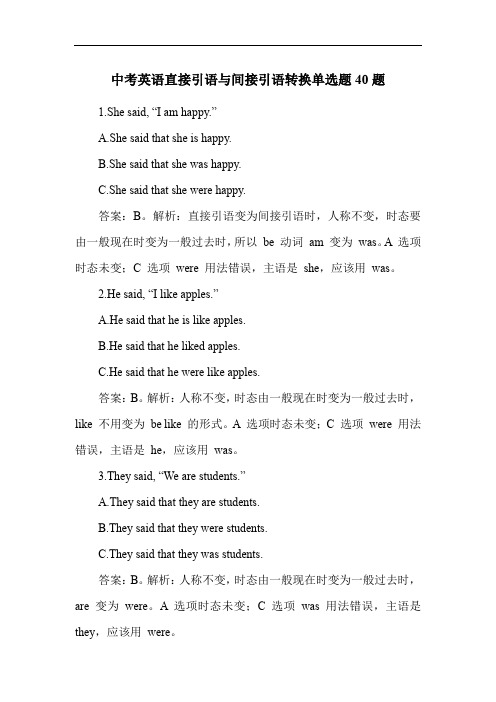
中考英语直接引语与间接引语转换单选题40题1.She said, “I am happy.”A.She said that she is happy.B.She said that she was happy.C.She said that she were happy.答案:B。
解析:直接引语变为间接引语时,人称不变,时态要由一般现在时变为一般过去时,所以be 动词am 变为was。
A 选项时态未变;C 选项were 用法错误,主语是she,应该用was。
2.He said, “I like apples.”A.He said that he is like apples.B.He said that he liked apples.C.He said that he were like apples.答案:B。
解析:人称不变,时态由一般现在时变为一般过去时,like 不用变为be like 的形式。
A 选项时态未变;C 选项were 用法错误,主语是he,应该用was。
3.They said, “We are students.”A.They said that they are students.B.They said that they were students.C.They said that they was students.答案:B。
解析:人称不变,时态由一般现在时变为一般过去时,are 变为were。
A 选项时态未变;C 选项was 用法错误,主语是they,应该用were。
4.She said, “You are beautiful.”A.She said that she are beautiful.B.She said that you were beautiful.C.She said that I was beautiful.答案:B。
解析:人称要根据说话对象变化,直接引语中的you 在间接引语中变为说话对象的人称,即she 说的对象应该是you,时态由一般现在时变为一般过去时,are 变为were。
直接引语和间接引语的转换方法

直接引语和间接引语的转换方法直接引语和间接引语是英语中常见的两种引述方式。
直接引语是将某人的原话直接用引号括起来,而间接引语则是将他人的话转述出来。
在英语写作中,我们经常需要进行直接引语和间接引语的转换。
本文将介绍关于直接引语和间接引语的转换方法。
一、直接引语的转换为间接引语当我们需要将直接引语转换为间接引语时,需要注意以下几点:1. 主要变化:将引号去掉,改为使用"that"引导从句。
例如:直接引语:“I am going to the park,” she said.间接引语:She said that she was going to the park.2. 时态变化:根据引语所表示的时间改变时态。
例如:直接引语:“I am studying English,” he said.间接引语:He said that he was studying English.3. 人称变化:根据引语所表示的人称改变人称。
例如:直接引语:“I will help you,” he said.间接引语:He said that he would help me.4. 指示变化:根据引语中的指示词改变指示词。
例如:直接引语:“This is a book,” she said.间接引语:She said that that was a book.5. 修饰变化:根据引语中的修饰词改变修饰词。
例如:直接引语:“I love this beautiful city,” she said.间接引语:She said that she loved that beautiful city.二、间接引语的转换为直接引语当我们需要将间接引语转换为直接引语时,需要注意以下几点:1. 去除“that”:将从句中的"that"去除。
例如:间接引语:She said that she was busy.直接引语:“I am busy,” she said.2. 时态变化:根据引语所表示的时间改变时态。
初三英语直接引语间接引语转换与语境理解技巧单选题40题
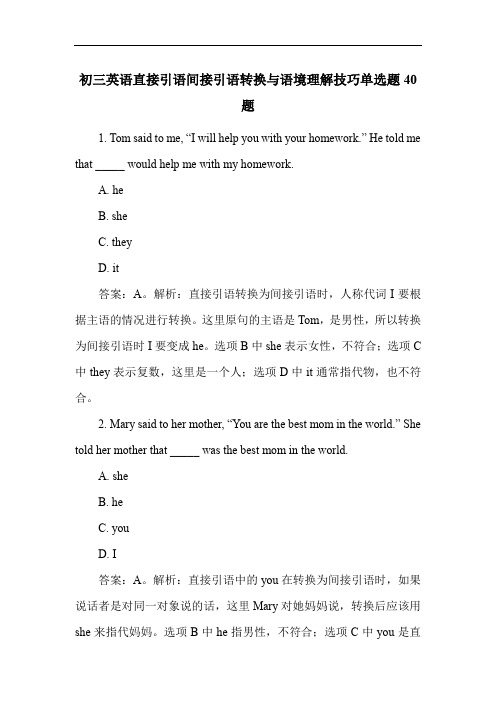
初三英语直接引语间接引语转换与语境理解技巧单选题40题1. Tom said to me, “I will help you with your homework.” He told me that _____ would help me with my homework.A. heB. sheC. theyD. it答案:A。
解析:直接引语转换为间接引语时,人称代词I要根据主语的情况进行转换。
这里原句的主语是Tom,是男性,所以转换为间接引语时I要变成he。
选项B中she表示女性,不符合;选项C 中they表示复数,这里是一个人;选项D中it通常指代物,也不符合。
2. Mary said to her mother, “You are the best mom in the world.” She told her mother that _____ was the best mom in the world.A. sheB. heC. youD. I答案:A。
解析:直接引语中的you在转换为间接引语时,如果说话者是对同一对象说的话,这里Mary对她妈妈说,转换后应该用she来指代妈妈。
选项B中he指男性,不符合;选项C中you是直接引语中的用法,在间接引语中不合适;选项D中I在这里不能指代妈妈。
3. Jack said to his friends, “We are going to have a party tonight.” He told his friends that _____ were going to have a party that night.A. theyB. weC. youD. I答案:A。
解析:直接引语中的we如果指的是原句主语及其同伴,在转换为间接引语时要变成they。
这里Jack和他的朋友们,转换后用they来表示。
选项B中we是直接引语中的用法,间接引语中不合适;选项C中you不符合语境;选项D中I也不符合。
直接引语和间接引语的转换方法英语

直接引语和间接引语的转换方法英语直接引语(direct speech)是直接将别人的原话或陈述内容用引号标注,而间接引语(indirect speech)是转述别人的原话或陈述内容而不使用引号标注。
在将直接引语转换为间接引语时,需要进行一些语法和词汇上的调整。
以下是转换的方法:1. 时间和地点的变化:- 如果转述的谈话发生在过去,直接引语中的时间和地点词需要相应的过去时态变化,如"now" 变为 "then","here" 变为"there"。
- 如果转述的谈话发生在现在,则不需要改变时间和地点词。
2. 人称的变化:- 一般来说,将第一人称(如"I")变为第三人称(如"he"),将第二人称(如"you")变为相应的人称(如"she")。
- 如果转述的谈话发生在过去,则要相应地改变人称的时态,如现在时变为过去时。
3. 动词的变化:- 将直接引语中的动词时态改为适当的间接引语时态。
例如,将直接引语中的一般现在时"am/is/are"改为一般过去时"was/were",将一般过去时改为过去完成时,等等。
4. 介词的变化:- 根据动词或名词的要求,根据需要调整直接引语中的介词使用和位置。
5. 语态的变化:- 如果直接引语是主动语态,转换为间接引语时可以保持主动语态或改为被动语态,根据需要进行调整。
需要注意的是,每个句子和语境可能有不同的转换规则和要求,以上提供的是一般的转换方法。
通过练习和实践,可以进一步掌握直接引语和间接引语的转换。
“直接引语”如何变成间接引语?

“直接引语”如何变成间接引语?为了配合我们的新概念课程,我们本文讲一讲直接引语和间接引语,以及它们之间如何变化的。
本文不算容易,尤其是对于刚接触的同学来说。
如果有疑问,可以留言,我会在留言里解答。
所谓直接引语,就是直接引述别人的话,不加任何改变,一般放在引号里。
如:He said, “I will learn English.”所谓间接引语,就是转述别人的话,此时需要改变一些内容,比如主语、时态、地点等。
如:He said that he would learn English.一、直接引语变间接引语时,句式变化方法如下:1. 陈述句直接引语:She said, “I will study English.”间接引语:She said that she would study English.既然转述别人的话,就不能再用人家的原话了,所以I就变成了she。
前面是said过去式,will也就变成过去时的would。
2. 一般疑问句直接引语:She asked me, “Can you speak English?”间接引语:She asked me whether I could speak English.如果别人的原话是一般疑问句,变成间接引语时记得要加上whether,然后倒装变为陈述语序。
3. 特殊疑问句直接引语:She asked me, “When can you do that?”间接引语:She asked me when I could do that.如果别人的原话是特殊疑问句,变成间接引语时不用加词,但要把倒装语序变成陈述语序。
4. 祈使句直接引语:She said to the children, “Don’t play outside.”间接引语:She told the children not to play outside.如果别人的原话是祈使句,don't 要变成not to,后面正常。
- 1、下载文档前请自行甄别文档内容的完整性,平台不提供额外的编辑、内容补充、找答案等附加服务。
- 2、"仅部分预览"的文档,不可在线预览部分如存在完整性等问题,可反馈申请退款(可完整预览的文档不适用该条件!)。
- 3、如文档侵犯您的权益,请联系客服反馈,我们会尽快为您处理(人工客服工作时间:9:00-18:30)。
直接英语和间接英语句型转换•一、句型的变化•(一)如果直接引语是陈述句,间接引语一般是用that来引导。
口语中that常可以省略。
•“I like to listen to rock music,” said Peter.•Peter said that he liked to listen to rock music.•【温馨提示】如果直接引语中出现两个或两个以上的陈述句并列时,第一个that可以省略,后面一个不能省略,以免引起歧义。
如:•Theteachersaid,“Thetextisveryimportant.Youshouldlearnitbyheart.”•Theteache r said (that) the text is important and that we should learn it by heart.(二)如果直接引语是一般疑问句或选择疑问句时,间接引语常变为由whether/if引导,而且要用陈述句语序。
如:1)Theboyaskedhismother,“CanIgotoplayfootballwithmyfriendsonSaturday?”The boy asked his mother whether/if he could go to play football with his friends on Saturday.2) “Will you go to the museum this weekend or next weekend?” Li Hua asked me.Li Hua asked me whether/if I would go to the museum this weekend or the next weekend.(三)如果直接引语是特殊问句,间接引语用特殊疑问词引导,而且用陈述句语序。
如:“How much time do you spend on the homework?” he asked me.He asked me how much time I spent on the homework.(四)如果间接引语是表示请求、提议、建议、劝告等意义的问句,要借助其他句型结构来表达。
如:1)“Would you buy me some stamps while you are in the office?” He said to me.He asked me to buy him some stamps while I am in the office.2)“Why don’t you come and play football with me?” He asked.He advised me to play football with him.【温馨提示】表示请求、劝告时,通常用“ask/advise/want等+宾语+动词不定式”结构。
1(五)如果直接引语是祈使句,间接引语要用不定式的复合结构改,即改为:tell (ask, order,warn, advise等) sb. (not) to do sth.如:1)The policeman said to the children, “Don’t play football in the street.”The policemantold the children not to play football in the street.2)“Listen to me carefully, please.” the teacher said to us.The teacher told us to listen to him carefully.【温馨提示】如果祈使句中出现了please,在间接引语中必须省略。
(六)如果直接引语是感叹句,变间接引语时,用what, how或that来引述。
如:“What a beautiful house it is!” he said t o me.He told me what a beautiful house it was.He told me that it was a beautiful house.二、时态的变化(一)如果主句的时态是一般现在时或将来时,则间接引语中的时态不变。
如;He says, “I’m too tired.”He says (that) heistoo tired.(二)如果主句的时态是一般过去时,则间接引语中的时态相应地变为与过去相关的时态。
具体变化如下:一般现在时一般过去时现在进行时过去进行时现在完成时过去完成时一般过去时过去完成时过去完成时过去完成时一般将来时过去将来时1)The old man said, “Great changeshave taken placein China.”The old man said that greatchangeshad taken placein China.2)“ Wang Linis waiting foryou outside of the school gate.” Li Fang said to me.Li Fang told me that Wang Linwas waiting forme outside of the school gate2【温馨提示1】当转述的是客观事实、科学真理、格言或谚语;重复出现或现在习惯性的动作时,间接引语的时态不变化。
如:1)He said, “The earth travels around the sun.”He said that the earthtravelsaround the sun.2)“Failure is the mother of success.” The t eacher said to us.The teacher told us that failureisthe mother of success.【温馨提示2】当直接引语中的谓语动词含有情态动词must , need, ought to, had better等,变间接引语时,间接引语中谓语动词的形式不变。
如:1)He said, “You had better ask for help when you are in trouble.”He said that I had better ask for help when I was in trouble.三、人称代词的变化直接引语变为间接引语时,间接引语中作主语的人称代词或其他物主代词要作相应的变化。
一般情况下要遵循以下几条原则:(一)直接引语的主语是第一人称,变为间接引语时,要和主句的主语保持一致。
如:“Can I use your bike for a moment?” the boy said to me.The boyaskedmewhether he could usemybike for moment.(二)直接引语的主语是第二人称,变为间接引语时,要和主句的宾语保持一致。
如:The teacher asked Joan, “Why are you late again?”The teacher askedJoanwhyshewas late again.(三)直接引语的主语是第三人称,变为间接引语时,间接引语中的主语人称不变。
如:He asked me, “How long has Teddystayed in China?”He asked me how long has Teddystayed in China.四、主句谓语动词的变化(一)直接引语是陈述句,谓语动词是say(said)的不变,是said to sb.常变为told sb.如:He said to his friend, “I am glad to see you.”He told his friend that he was glad to see him.3(二)直接引语是特殊疑问句、一般疑问句或选择疑问句,said变为asked; said to sb.变为asked sb.如:“How can you do that?” Mary said to Betty.Mary asked Betty how she could do that.(三)直接引语是祈使句,变间接引语时,谓语动词可根据语气强弱选则beg, advise, ask,tell, order, warn等。
如果祈使句是否定句,还需在不定式符号to前加not.如:I said to her, “Please pass me a glass of water.”I asked her to pass me a glass of water.She said, “Don’t smoke in the public place.”She told me not to smoke in the public place.(四)直接引语是感叹句,变间接引语时,引述动词常用tell, exclaim 或say等。
如:“How well he looks!” he said.He exclaimed how well he looked.He said that he looked well.五、指示代词、时间状语、地点状语和方向性动词的变化(一)指示代词的变化thisthatthesethose但有时如果所说的东西就在眼前,也可不变。
如:He said, “I like this book.”He said that he liked this book. (书在眼前)二)时间状语的变化todaythat daythis morning/afternoon, etc.that morning/afternoon, etc.yesterdaythe day beforetomorrowthe following/next daythe day after tomorrowtwo days laternext week/month, etc.the next week/month, etc.last week/monththe week /month beforenowthen4如果引述的时间和说话时间相同(如就在同年、同月、同日),时间状语也可不变。
如:MrBlacksaid,“IvisitedtheGreat Walllastyear.”MrBlacksaidthathehad visitedtheGreat Wall the year before.Mr Black said that he had visited the Great Wall last year.(三)地点和方向性动词的变化heretherecomego如果说话人所在地和引述地点相同,here,come也可不变。
